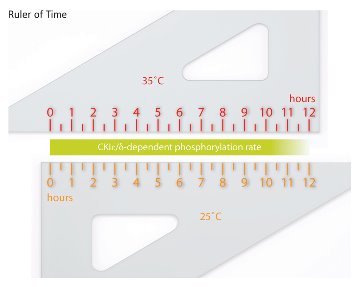Nov. 6, 2009 Research Highlight Biology
Keeping the circadian clock ticking
The daily rhythm of mammals is maintained by a key molecular process that is unaffected by changes in ambient temperature
 Figure 1: Schematic illustrating that phosphorylation by CKIε and CKIδ occurs at the same rate regardless of temperature, meaning that the daily cycle is not disrupted by changes in temperature. The process is therefore essential for maintaining the circadian rhythm in mammals.
Figure 1: Schematic illustrating that phosphorylation by CKIε and CKIδ occurs at the same rate regardless of temperature, meaning that the daily cycle is not disrupted by changes in temperature. The process is therefore essential for maintaining the circadian rhythm in mammals.
The daily cycle of waking and sleeping in mammals, including humans, is governed by a complex array of cellular processes, which have only recently been uncovered. One important molecular process that acts to keep the circadian rhythms of mammals ‘up to speed’ with the sun—within a period close to 24 hours—has now been discovered by Masato Nakajima and Hideki Ukai at the RIKEN Center for Developmental Biology in Kobe and their co-workers. Importantly, this process is independent of temperature, meaning that the daily cycle is not disrupted by the changing seasons.
According to Ukai, “Circadian clocks regulate many physiological phenomena such as sleep–awake cycles, blood pressure, hormonal secretions and drug metabolism.” To investigate this important system, he and his co-workers tested 1,260 different compounds, chosen from the Sigma-Aldrich Library of Pharmacologically Active Compounds (LOPAC), by adding them to cells from both humans and mice1.
The team identified ten compounds that lengthened the circadian period of cells. At least nine of the compounds were found to suppress the activity of casein kinase enzymes called CKIε and CKIδ. By increasing the concentration of these compounds even further, the researchers almost doubled the circadian period to 48 hours. The results imply that, under normal circumstances, both CKIε and CKIδ act to set the speed of circadian rhythms. They do this by adding a phosphate group, or phosphorylating, and thus deactivating, a protein called PERIOD in a process that is completely independent of temperature (Fig. 1). Such temperature insensitivity is a rare trait for biochemical reactions but was recently observed in enzyme reactions in the cyanobacterial clock. Similar findings for mammals by this team suggest that temperature insensitivity could be a conserved evolutionary principle across species, maintaining a consistent circadian clock even under the normal physiological range of environmental changes.
The researchers suggest that the accelerating effect provided by CKIε and CKIδ probably dominates other reactions that decelerate the circadian clock. Nakajima hopes that by quantifying the effects of all these processes, the research could have widespread medical applications. “These compounds may become the seeds to develop new drugs for circadian rhythm abnormalities or insomnia,” he says. With this goal in mind, the team is already assessing the importance of CKI-dependent phosphorylation in defining circadian rhythms in cells and tissues. “At the same time, we are focusing on how the temperature-insensitive phosphorylation works at an atomic level.”
References
- 1. Isojima, Y., Nakajima, M., Ukai, H., Fujishima, H., Yamada, R.G., Masumoto, K., Kiuchi, R., Ishida, M., Ukai-Tadenuma, M. Minami, Y. et al. CKIε/δ-dependent phosphorylation is a temperature-insensitive, period-determining process in the mammalian circadian clock. Proceedings of the National Academy of Sciences USA 106, 15744–15749 (2009). doi: 10.1073/pnas.0908733106
